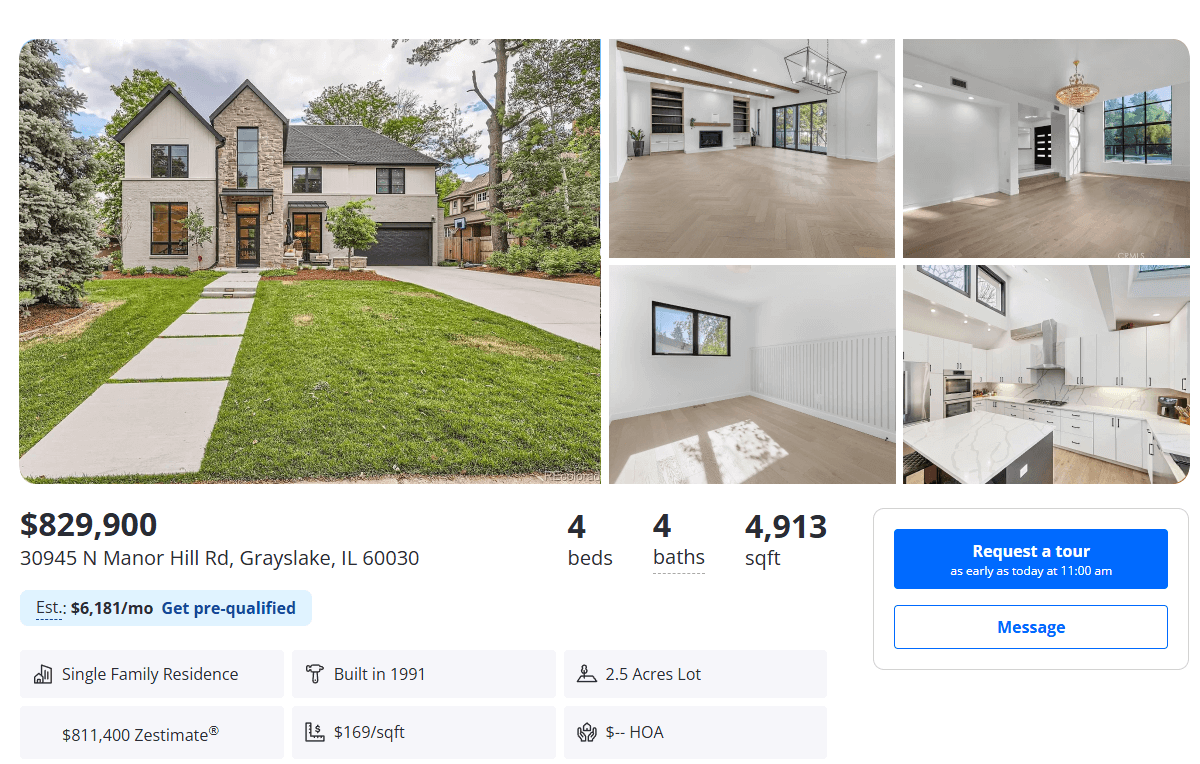House hunting can oftentimes feel like searching for a needle in a haystack. With endless listings, competing priorities, and ever-changing market trends, buyers often find themselves overwhelmed by choice yet underwhelmed by options that truly fit their needs. Thankfully, AI-powered property search tools are stepping in, leveraging machine learning to sift through numerous listings and bring homes that match each buyer’s unique preferences.
By learning your preferences, analyzing market data, and predicting your future needs, AI makes finding the right home faster, smarter, and more personalized. Instead of endless scrolling, first-time home buyers can now rely on AI in property search to highlight the best options, like balancing budget, location, and lifestyle, and even uncover hidden gems they might have missed. In this blog, we’ll explore how AI is transforming the chaos of house hunting into a clear, confident path toward your dream home.
What Is AI in Property Search?
Artificial intelligence refers to computer systems capable of performing tasks that historically required human intelligence, like recognizing patterns, learning from data, and making decisions. AI in property search uses algorithms—step-by-step instructions for solving problems—to analyze data, spot patterns, and make decisions.
Here’s how it works for property searches.
Most real estate platforms integrate AI tools like machine learning and predictive analytics. When you browse listings, AI studies your clicks, saves, and search filters to figure out your priorities. Over time, it refines recommendations to match your tastes.
AI also crunches vast amounts of data, like neighborhood crime stats, price histories, and market demand, to predict which homes might rise in value or fit your budget. Some platforms even use AI-powered image recognition to scan property photos for features such as hardwood floors or granite countertops and flag homes that align with your preferences.
Alongside these innovations, a good property search tool can help users dig into detailed property histories and neighborhood insights, making it easier to narrow down options with solid, data-driven context. Major platforms like Zillow and Realtor.com use AI to personalize searches and streamline decisions.
How AI Provides Smarter Property Recommendations

Artificial intelligence is transforming the way we search for homes, making the process faster, more personalized, and more efficient. Here’s how AI enhances property recommendations:
Personalized listings
AI analyzes user behavior, such as saved properties, search histories, and time spent on listings, to refine recommendations. Over time, it learns your preferences, ensuring that each suggestion is more relevant than the last.
Predictive insights
By tracking your past activity, AI in property search predicts what you, as a home buyer, may like before you begin the search. If, for example, you frequently view three-bedroom homes with gardens, the algorithm will prioritize similar properties.
More efficient listings
Artificial intelligence is redefining how listings are created in the first place. From AI-generated property descriptions that can be as general or detailed as you wish to superb, real estate photo generation and editing services, specifically AI virtual staging, that dramatically reduce the time and costs of preparing listing photos, AI has helped hundreds of agents amp up their listings and engage their audiences much more effectively.
Location matching
AI doesn’t just focus on matching homes. It matches you with your preferred neighborhood. It factors in your budget, lifestyle, workplace location, and neighborhood amenities, and suggests ideal areas you may not have considered.
Property alerts
Although the real estate market is fast-paced, AI rises to the challenge, tracking updates instantly. As a potential buyer, you will receive alerts when a home matching your criteria hits the market or drops in price, giving you an edge in competitive markets.
For instance, Joe, a first-time home buyer in Chicago, wants a modern townhouse close to downtown but keeps finding overpriced or outdated listings. After using an AI-driven real estate platform, the system learned his preferences: Open layouts, smart home features, and easy transit access.
Within days, AI narrowed his search to up-and-coming neighborhoods he hadn’t considered, predicting he’d like the artsy district. When a newly listed townhouse with a rooftop and a price drop hit the market, Joe got an instant alert. He toured the property the next day and made an offer before the competition knew about the listing.
Benefits for Homebuyers

Here are some benefits you enjoy as a homebuyer when you conduct property searches with the help of AI in property search:
- Saves Time by Filtering Irrelevant Listings: No more scrolling through hundreds of mismatched homes. AI learns your must-haves and instantly weeds out properties that don’t fit.
- Helps Discover Overlooked Properties: AI systems can identify properties that align with your preference but might not have been on your radar. By learning from your interactions and preferences, AI can suggest homes in emerging neighborhoods you hadn’t initially considered, expanding your options.
- Reduces Decision Fatigue: Too many property listings can be overwhelming. AI in property search narrows your options based on what truly matters to you, reducing the mental burden of decision-making. While AI simplifies the search, consulting with a real estate attorney can help ensure that all legal aspects of the property transaction are properly handled.
- Improves Confidence in Choice: With AI analyzing market data, price trends, and neighborhood insights, you make informed decisions, making you feel more confident in your choices, knowing your decision is backed by data-driven insights.
AI can help you feel more confident by presenting data-driven suggestions. But for long-term decisions, like buying a home that may be passed down through generations, it’s wise to speak with an estate planning attorney who can help align your purchase with your legacy goals.
Are There Any Downsides?
Although AI has revolutionized the property search experience, it has its limitations:
- AI can’t read emotions: While it can crunch data easily, it can’t replicate that gut feeling you get about a property or the neighborhood during a walk-through. It won’t notice a home’s cozy feel or warn you about noisy neighbors.
- Human judgment is still important: An algorithm can miss distinct features like future neighborhood development or local peculiarities. A seasoned realtor can spot these oddities, such as a street prone to overflooding, filling the gap that the AI tool can’t.
- AI relies on your personal data to work: When sensitive data is not adequately protected, it can result in a vulnerable breach or misuse. Avoid oversharing your data, and ensure the platform uses encryption and has clear privacy policies.
The Future of AI in Property Search
The AI property search revolution is just getting started. As technology evolves, homebuyers can expect more intuitive tools to simplify the hunt without losing the human touch.
- AI Chat Assistants: Future AI chatbots will handle complex queries in real-time, acting like friendly and patient assistants.
- Voice-Activated Search: AI in property search enables a hands-free, efficient search by allowing you to search for property using voice commands, allowing you to multitask while refining your search.
- Visual Property Discovery: Snap a picture of a house you like, and AI will find similar styles, layouts, and neighborhoods. This technology enhances the search by focusing on visual preferences, making it easier for you to find homes that match your aesthetic desires.
- Supporting Human Decision Making: AI tools are designed to support, not replace, human judgment. Personal experience during property visits, emotional nuances, and complex decision-making processes still rely heavily on human insight.
Time to Integrate AI in Your Search
AI has simplified the home buying process, making it more efficient and personalized. AI-driven platforms analyze user preferences and behaviors to provide tailored property recommendations, saving time and reducing decision fatigue.
Look for features like smart filters, predictive alerts, or chatbot assistants to answer questions on the go. By exploring these technologies, you can navigate the real estate market with greater confidence and ease.
As voice search, visual discovery, and AI advisors evolve, the home-buying process will get faster and more intuitive.





